Black History Month Spotlight: Malvin "Mal" Whitfield
02/01/2024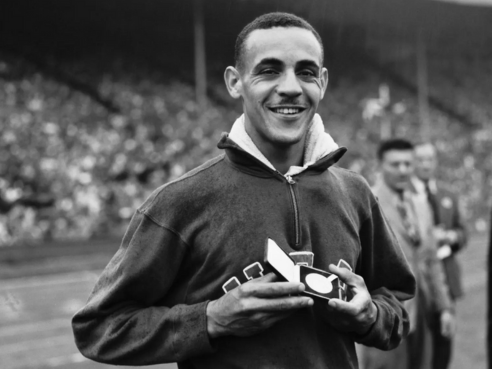
Black History Month is an annual celebration of the achievements by Black Americans and a time for recognizing their role in U.S. History. This week we are commemorating Malvin Whitfield.
by Alexander Gagnon
There are not many people who lived life to the fullest more than Malvin “Mal” Whitfield. An athlete, a pilot, a coach, and an ambassador, “Marvelous Mal”, as he was known, achieved more than most would ever think possible with his humble upbringing and challenging childhood. But after winning five Olympic medals, including three golds, traveling to over 132 countries, and being a lifelong goodwill ambassador of sport, Whitfield had one of the most extraordinary lives a person can have.
He was named the nation’s top amateur athlete for 1954, becoming the first Black American to win the AAU Sullivan Award. He’s been inducted into the National Track and Field Hall of Fame, and the Ohio State Varsity O Hall of Fame. He helped train multiple generations of new athletes to pursue their own Olympic dreams, and he was never too busy to help someone.
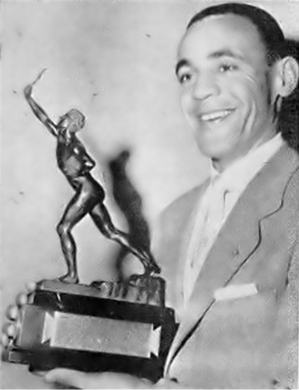
Whitfield holding the AAU Sullivan Award as the nation’s top athlete in 1954 (Credit: Jet Magazine)
Whitfield was born on October 11, 1924, in Bay City, Texas but he wasn’t there for long. When he was four years old, his family moved to Watts in southern Los Angeles. Around the same time as the move, his father passed away. Mal’s mother would also die when he was young, as she passed away when he was only 12.
His older sister Betty fought to be his legal guardian and got a court order to ensure he would not be sent to an orphanage. They had to survive not only the loss of their parents, but also the Great Depression that was financially impacting millions around the world.
Despite these circumstances, Whitfield’s interest in becoming an Olympic athlete kicked off when he snuck into the 1932 Olympic Games to see the 100m dash – where Eddie Tolan defeated Ralph Metcalfe by “a gnat’s eyelash”, according to sportswriter Grantland Rice. The race was incredible, and Whitfield was hooked. He made it a life’s mission to become an Olympic athlete.
“From that moment on, I knew I wanted to run in the Olympic Games,” Whitfield said during a 1991 interview with Sports Illustrated.
After finishing high school in 1943, he joined the Army Air Corps as a member of the famed Tuskegee Airmen. While celebrated now as trailblazers, the group was heavily discriminated against at the time. Regularly having to work with old, substandard equipment and banned from military bases, life as a member of the Tuskegee Airmen was rarely pleasant and even less fair. But it didn’t sway Whitfield as he would also serve during the Korean War, flying as an aerial gunner during 27 combat missions.
As a serviceman, Whitfield had to find unique ways to get training in. On nights between bombing missions, he would run on the icy airstrip runway to stay in top form the year before the 1952 Helsinki Olympics. He was still an active staff sergeant when he arrived in London for the 1948 Olympic Games.
With the conclusion of WWII, Whitfield returned to the states and enrolled at Ohio State University. He would win an NCAA championship with the Buckeyes in the 800m in 1948. He would become a force at the AAU National Championships, winning titles in the 400m once, 880yd twice, and 800m three times.
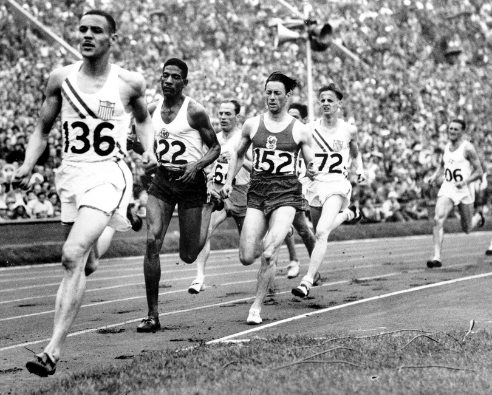
Whitfield (left) leads Arthur Wint (2nd from left) and the rest of the field in the 1948 Olympic 800m finals (Credit: AP)
He arrived as a member of the US National Team in London for the 1948 Olympic Games, the first Olympiad in 12 years due to WWII. Going into the 800m heats, many projected the battle for gold would be between Whitfield and Jamaica’s Arthur Wint. Whitfield wasn’t a small man by any means, standing at 6’1”, but Wint stood nearly 6’5” and had an incredibly long stride. With his work cut out for him, Whitfield won his heat and placed second in his semifinal to advance. And at Wembley Stadium, on a track still damp from the morning’s rainstorm, it was Whitfield who made his move at the midway point to go from fourth to first and score the gold medal in the finals.
“Standing on the dais (podium) and receiving my gold medal, I couldn’t help but shed a few tears because this was my childhood ambition,” said Whitfield in a later interview about the 1948 800m finals. “Marvelous Mal” would also take gold in the 4x400m relay, and a bronze in the 400m.
Whitfield once again got to duel with Wint for the 800m title in 1952 at the Helsinki Olympic Games. He got marred in the back early but was able to surge around the outside with a couple hundred meters to go and take the lead. From there, he was able to hold off a surging Arthur Wint and Whitfield claimed his second 800m Olympic gold and his third and final gold medal. He would be a member of the silver medal winning 4x400m team a few days later for his last Olympic medal.
By the mid-1950s, Whitfield became a Sports Goodwill Ambassador for the U.S., touring Europe, Africa, and the Middle East. He eventually accepted an appointment from the Liberian Government as a physical education and sports advisor to then President William V. S. Tubman. So began a 47-year career all around Africa, training and consulting countless athletes, including many Olympic and All-Africa Games champions.
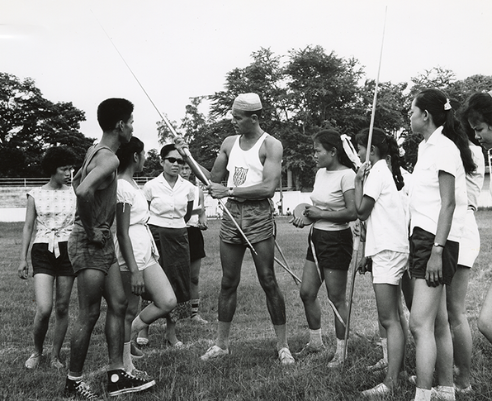
Whitfield discusses javelin techniques with Laotian physical education instructors in 1963. (Bureau of Educational and Historical Affairs Papers (MC 468), box 347, folder 31. University of Arkansas, Fayetteville, Special Collections)
He coached in 20 countries over his time around the world and arranged sports scholarships for over 5,000 African athletes to study and train in the United States. For his efforts and contributions, then U.S. President Ronald Reagan marveled at Whitfield’s achievements.
“Whether flying combat missions over Korea, or winning gold medal after gold medal at the Olympics, or serving as an ambassador of goodwill among the youth athletes of Africa, you have given it your all. This country is proud of you, and grateful to you,” Reagan wrote of him.
He was also an active member in the civil rights movement. He called for Black athletes to boycott the 1964 Tokyo Olympics as a way for athletes to take part in the civil rights movement. His article in Ebony Magazine calling for the boycott emphasized the differences between what happens when a Black Olympic champion steps off the podium and a white Olympic champion and how it stood against the American promise of Liberty, Equality, and Justice for all.
“I think every athlete and every coach should be dedicated to the real purpose of going abroad to represent a ‘free country’. We are not representing a ‘free country’ when we do not stand for our equal rights,” Whitfield penned in his article.
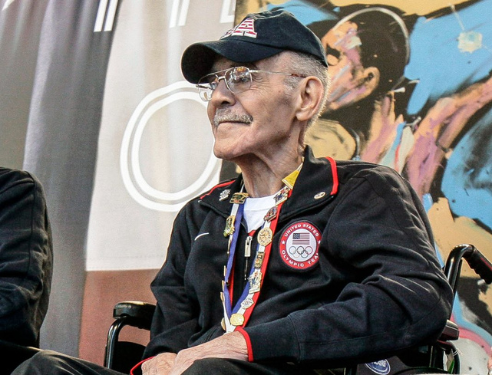
Whitfield in 2012 (Credit: AP)
Whitfield retired from his role as an ambassador in 1989, but continued to spread goodwill wherever he went and served as a speaker. His daughter, CNN anchor Fredricka Whitfield, received numerous stories from people about her dad and his kind heart: a woman who he helped carry across a large puddle during a rainstorm, a man who Whitfield lent his running shoes to so that he could also compete in a track meet, and countless others.
He got to visit over 132 countries in his lifetime, and one of his last trips was to the 2012 Olympics in London. It was a full circle moment to return to the site of his first Olympic gold medal victory over 60 years prior. Another in a long line of opportunities to see firsthand how his compassion, drive, and legacy got to positively affect the next generation of athletes.
The Whitfield Foundation continues his legacy by dedicating themselves to the promotion of sports, academics, and culture around the globe.
“Marvelous Mal” passed away at the age of 91 in 2015 and is buried at Arlington National Cemetery. His global impact continues to be felt today and will be for years to come.
There are not many people who lived life to the fullest more than Malvin “Mal” Whitfield. An athlete, a pilot, a coach, and an ambassador, “Marvelous Mal”, as he was known, achieved more than most would ever think possible with his humble upbringing and challenging childhood. But after winning five Olympic medals, including three golds, traveling to over 132 countries, and being a lifelong goodwill ambassador of sport, Whitfield had one of the most extraordinary lives a person can have.
He was named the nation’s top amateur athlete for 1954, becoming the first Black American to win the AAU Sullivan Award. He’s been inducted into the National Track and Field Hall of Fame, and the Ohio State Varsity O Hall of Fame. He helped train multiple generations of new athletes to pursue their own Olympic dreams, and he was never too busy to help someone.

Whitfield holding the AAU Sullivan Award as the nation’s top athlete in 1954 (Credit: Jet Magazine)
Whitfield was born on October 11, 1924, in Bay City, Texas but he wasn’t there for long. When he was four years old, his family moved to Watts in southern Los Angeles. Around the same time as the move, his father passed away. Mal’s mother would also die when he was young, as she passed away when he was only 12.
His older sister Betty fought to be his legal guardian and got a court order to ensure he would not be sent to an orphanage. They had to survive not only the loss of their parents, but also the Great Depression that was financially impacting millions around the world.
Despite these circumstances, Whitfield’s interest in becoming an Olympic athlete kicked off when he snuck into the 1932 Olympic Games to see the 100m dash – where Eddie Tolan defeated Ralph Metcalfe by “a gnat’s eyelash”, according to sportswriter Grantland Rice. The race was incredible, and Whitfield was hooked. He made it a life’s mission to become an Olympic athlete.
“From that moment on, I knew I wanted to run in the Olympic Games,” Whitfield said during a 1991 interview with Sports Illustrated.
After finishing high school in 1943, he joined the Army Air Corps as a member of the famed Tuskegee Airmen. While celebrated now as trailblazers, the group was heavily discriminated against at the time. Regularly having to work with old, substandard equipment and banned from military bases, life as a member of the Tuskegee Airmen was rarely pleasant and even less fair. But it didn’t sway Whitfield as he would also serve during the Korean War, flying as an aerial gunner during 27 combat missions.
As a serviceman, Whitfield had to find unique ways to get training in. On nights between bombing missions, he would run on the icy airstrip runway to stay in top form the year before the 1952 Helsinki Olympics. He was still an active staff sergeant when he arrived in London for the 1948 Olympic Games.
With the conclusion of WWII, Whitfield returned to the states and enrolled at Ohio State University. He would win an NCAA championship with the Buckeyes in the 800m in 1948. He would become a force at the AAU National Championships, winning titles in the 400m once, 880yd twice, and 800m three times.

Whitfield (left) leads Arthur Wint (2nd from left) and the rest of the field in the 1948 Olympic 800m finals (Credit: AP)
He arrived as a member of the US National Team in London for the 1948 Olympic Games, the first Olympiad in 12 years due to WWII. Going into the 800m heats, many projected the battle for gold would be between Whitfield and Jamaica’s Arthur Wint. Whitfield wasn’t a small man by any means, standing at 6’1”, but Wint stood nearly 6’5” and had an incredibly long stride. With his work cut out for him, Whitfield won his heat and placed second in his semifinal to advance. And at Wembley Stadium, on a track still damp from the morning’s rainstorm, it was Whitfield who made his move at the midway point to go from fourth to first and score the gold medal in the finals.
“Standing on the dais (podium) and receiving my gold medal, I couldn’t help but shed a few tears because this was my childhood ambition,” said Whitfield in a later interview about the 1948 800m finals. “Marvelous Mal” would also take gold in the 4x400m relay, and a bronze in the 400m.
Whitfield once again got to duel with Wint for the 800m title in 1952 at the Helsinki Olympic Games. He got marred in the back early but was able to surge around the outside with a couple hundred meters to go and take the lead. From there, he was able to hold off a surging Arthur Wint and Whitfield claimed his second 800m Olympic gold and his third and final gold medal. He would be a member of the silver medal winning 4x400m team a few days later for his last Olympic medal.
By the mid-1950s, Whitfield became a Sports Goodwill Ambassador for the U.S., touring Europe, Africa, and the Middle East. He eventually accepted an appointment from the Liberian Government as a physical education and sports advisor to then President William V. S. Tubman. So began a 47-year career all around Africa, training and consulting countless athletes, including many Olympic and All-Africa Games champions.

Whitfield discusses javelin techniques with Laotian physical education instructors in 1963. (Bureau of Educational and Historical Affairs Papers (MC 468), box 347, folder 31. University of Arkansas, Fayetteville, Special Collections)
He coached in 20 countries over his time around the world and arranged sports scholarships for over 5,000 African athletes to study and train in the United States. For his efforts and contributions, then U.S. President Ronald Reagan marveled at Whitfield’s achievements.
“Whether flying combat missions over Korea, or winning gold medal after gold medal at the Olympics, or serving as an ambassador of goodwill among the youth athletes of Africa, you have given it your all. This country is proud of you, and grateful to you,” Reagan wrote of him.
He was also an active member in the civil rights movement. He called for Black athletes to boycott the 1964 Tokyo Olympics as a way for athletes to take part in the civil rights movement. His article in Ebony Magazine calling for the boycott emphasized the differences between what happens when a Black Olympic champion steps off the podium and a white Olympic champion and how it stood against the American promise of Liberty, Equality, and Justice for all.
“I think every athlete and every coach should be dedicated to the real purpose of going abroad to represent a ‘free country’. We are not representing a ‘free country’ when we do not stand for our equal rights,” Whitfield penned in his article.

Whitfield in 2012 (Credit: AP)
Whitfield retired from his role as an ambassador in 1989, but continued to spread goodwill wherever he went and served as a speaker. His daughter, CNN anchor Fredricka Whitfield, received numerous stories from people about her dad and his kind heart: a woman who he helped carry across a large puddle during a rainstorm, a man who Whitfield lent his running shoes to so that he could also compete in a track meet, and countless others.
He got to visit over 132 countries in his lifetime, and one of his last trips was to the 2012 Olympics in London. It was a full circle moment to return to the site of his first Olympic gold medal victory over 60 years prior. Another in a long line of opportunities to see firsthand how his compassion, drive, and legacy got to positively affect the next generation of athletes.
The Whitfield Foundation continues his legacy by dedicating themselves to the promotion of sports, academics, and culture around the globe.
“Marvelous Mal” passed away at the age of 91 in 2015 and is buried at Arlington National Cemetery. His global impact continues to be felt today and will be for years to come.
 Email
Email Print
Print









